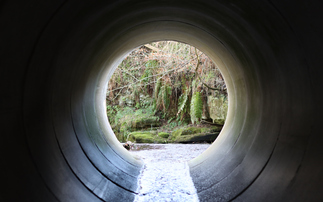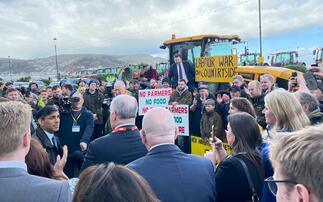Credit: iStock
EXCLUSIVE: New polling finds voters are split on future of the UK oil and gas industry, but Labour remains more trusted than Tories to deliver on jobs and net zero
The UK public is split over whether more new oil and gas drilling projects should be given the green light in the North Sea, with older voters far more in favour of the controversial move, while younger people are broadly against plans for new drilling licenses, exclusive polling data published today by BusinessGreen suggests.
The online poll saw BMG Research quiz over 1,600 voters last week on a variety of topical election issues, including the economy, jobs, net zero, and the environment. The survey included questions on whether voters thought the UK should expand oil and gas drilling in the North Sea - an issue where Labour and the Conservatives are offering opposing plans.
Among all voters, 38 per cent said they thought the UK should expand oil and gas drilling and 37 per cent were against, while a quarter - 25 per cent - said they did not know.
However, the data shows age is a big factor in determining preferences on the issue, with 52 per cent of those aged between 18 and 34 against new North Sea oil drilling, while only 22 per cent are in favour.
In contrast, among those aged 55 or older 53 per cent said they supported new oil and gas extraction compared to only 24 per cent against. And for those over 65, the gap was even wider, with 60 per cent in favour and 20 per cent against new North Sea oil and gas drilling.
Within the 35-54 age bracket, preferences were more evenly spread, however, with 39 per cent against new oil and gas drilling, and 35 per cent in favour.
The survey also found a greater proportion of men supported new oil and gas drilling than women, with 43 per cent of men in favour compared to 38 per cent against, whereas 34 per cent of women supported expanding drilling and 31 per cent said they were against it.
The poll was carried out on Tuesday and Wednesday last week as the debate over the future of the North Sea oil and gas industry intensified on the General Election campaign trail, with the Conservatives stepping up their attacks on Labour over its energy policies.
The Conservatives have pledged to revive legislation that would require the North Sea Transition Authority to issue new drilling licences every year, in a move it claims would help to secure jobs and boost energy security. It has also pledged to build more fossil gas power plants.
However, a raft of influential organisations including the International Energy Agency (IEA) and the Climate Change Committee (CCC) have said that exploiting new sources of fossil fuels risks undermining chances of meeting climate goals and limiting global warming to 1.5C.
Labour, meanwhile, has pledged to halt all licencing for new oil and gas drilling projects in the UK and increase the windfall tax on oil and gas firms, arguing new fossil fuel projects will do little to boost energy security or bring down energy bills. Instead, it is touting its 'Green Prosperity Plan' and 2030 sprint for clean power as a means of creating 650,000 new jobs.
The BMG Research polling published today by BusinessGreen in partnership with media agency Copper Consultancy shows Labour also remains more trusted by voters than the Conservatives across all key issues, from tackling the cost of living crisis and managing the economy, to ensuring energy security and conserving the environment.
"On many issues we are recording the strongest Labour lead we have ever seen," said BMG Research.
In terms of overall voting intention, Labour appears to have increased its lead over the Conservatives to 23 points, with 42 per cent of voters planning to back Keir Starmer's party at the ballot box on Thursday next week, up from 41 per cent the previous week.
Meanwhile, Reform UK - which has proposed scrapping the UK's net zero targets in its manifesto launched last Monday - now sits neck and neck with the Conservatives on 19 per cent, the highest voter intention share recorded by BMG Research for Nigel Farage's party to date.
Support for the Liberal Democrats has fallen slightly to a nine per cent share, down from 12 per cent the previous week, while the Green Party's share has shifted up one percentage point to seven per cent, according to the poll.
On net zero, voters appear to now be slightly more trusting of Labour to deliver on the UK's statutory climate targets than in previous weeks, while trust in the Tories to deliver on the issue appears to have fallen.
Just over a third of voters said they now trusted Labour to deliver the UK's net zero targets while 33 per cent said they did not. Just 15 per cent said they trusted the Tories on the issue and 55 per cent said they did not.
The previous week's polling found 31 per cent said they trusted Labour to deliver on net zero, while 38 per cent said they did not, and 17 per cent trusted the Tories compared to 58 per cent who said they did not.
However, the Greens remain the most trusted national party by UK voters to deliver net zero, with 43 per cent backing it to deliver on UK targets, with 20 per cent voicing their distrust. Just over a fifth of voters said they trusted the Lib Dems on the issue and 30 per cent said they did not.
"Much political commentary has been focused on a lack of trust during the general election campaign and this is certainly the case for achieving net zero goals," said BMG Research pollster Oliver White.
"Of all the parties, the British public were asked about, only the Green party are significantly more trusted than distrusted to meet the UK's net zero targets by 2035. Despite this, among the standard parties of government, Labour is far more trusted than the Conservatives."
The Conservatives and Labour have made competing claims over the potential impact of their policies on jobs, with the government claiming Labour's plans for the North Sea risk putting 200,000 jobs in jeopardy. Labour has rubbished these claims, however, and said its plans will create 650,000 new roles.
When asked which party they felt would best support job creation, skills training and new career opportunities, Labour came out top with more than a third backing the Party on the issue, ahead of the Tories on 14-15 per cent with over 27 per cent who said they did not know.
Annabel Beardsmore, director of strategic communications at Copper Consultancy, said the higher proportion of support for Labour on jobs suggested its green industrial policies were cutting through among voters.
"Labour has been keen to set out how its plan for Great British Energy and wider industrial strategy will create employment opportunities across the UK - and that's hitting home," she said.
"The Party wins out on this measure, with 39 per cent of voters saying that Labour is best placed for job creation, and 37 per cent for skills training. In comparison, only 14 per cent of voters think the Conservatives are the best party for creating jobs and skills training."
BMG Research polling commissioned on behalf of Copper Consultancy. BMG Research interviewed a representative sample of 1,627 GB adults online between 18th and 19th June 2024. BMG are members of the British Polling Council and abide by their rules.
BusinessGreen will be publishing weekly updates on voter intention polling in collaboration with BMG Research and Copper Consultancy in the run up to the 4 July election, covering a range of questions and issues on the green economy. The previous week's polling data can be accessed here.









